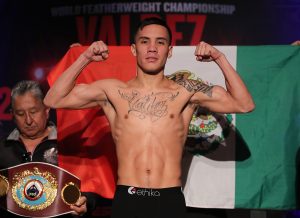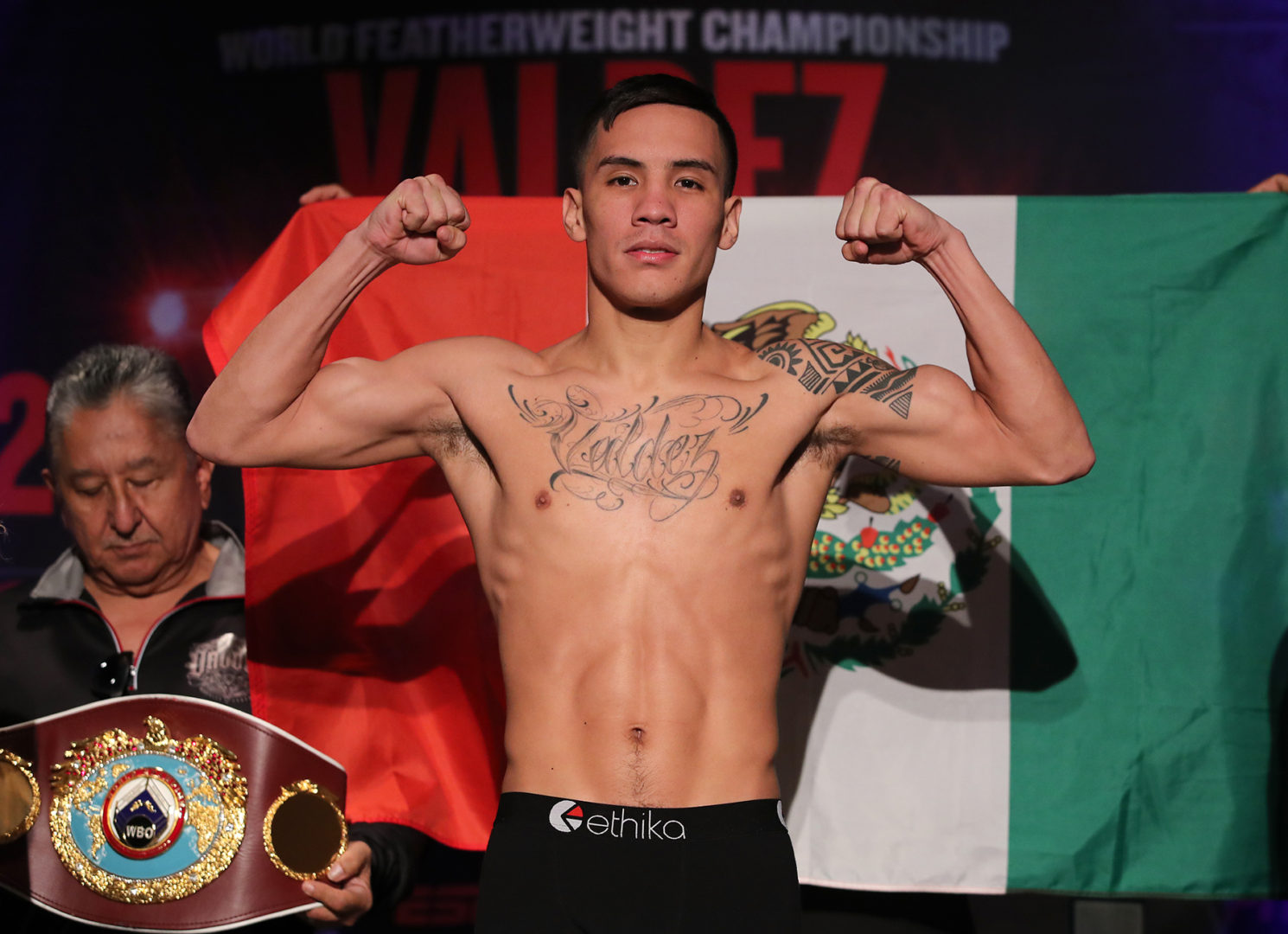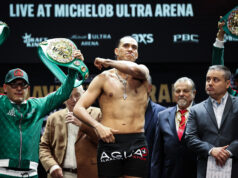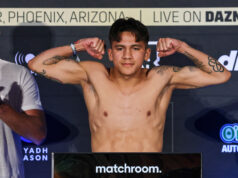By Norm Frauenheim-

For 48 minutes, Oscar Valdez Jr. showed more courage than you’ll see in a career. Six days later, I can only worry that maybe it was a career. Valdez’ epic battle in the rain against Scott Quigg at StubHub Center left him with broken teeth and a busted jaw. Only the heart wasn’t knocked out of place.
It was the kind of fight that can leave more than just scars. Truth is, it was more than one fight. There were several within the 36 minutes of exhausting punches and the one-minute between each three-minute battle. Those 60 seconds between rounds offered no refuge, no peace. Valdez spit up blood that fell into a pool faster and deeper than rain into puddles. The rain evaporated. The blood did not.
In the moments before the bell tolled and sounded a resumption of the conflict from round to round – from the second to the 12th, I wondered whether the carnage could continue. It could. It would. It still does. Now, Valdez sits with his jaw wired backed together. The fans and ESPN’s cameras are gone. The business has moved on. He’s left with pain, rehab and inevitable doubts about what kind of fighter he’ll be when he returns.
Valdez, who underwent the medical procedure on Monday, will be back, of course. But questions about whether that repaired jaw can hold up will be there. So, too, will questions about whether the wild fight exposed some newfound cracks in the psyche. The guess in this corner is that the psyche, like that heart, withstood the battle. But somebody will test it. Boxing is predatory art. Always has been.
Still, I wonder if this one could have been different. The controversial weigh-in leaves questions about whether Valdez could have avoided some of the damage he sustained in retaining his WBO featherweight title in winning a brutal decision over Quigg on March 10.
On the day before opening bell, Quigg came in nearly three pounds – 2.8, to be exact – above the limit, 126. He forfeited a chance to win the title and paid a 20 percent penalty of his documented purse, which in this case was a $100,000 contract filed with the California Commission. It’s believed Quigg’s real purse was about five times as big. The filing with California didn’t include UK money. But only the California number mattered, meaning Quigg forfeited at least $20,000, $10,000 of which went to Valdez. According to various sources, Quigg also agreed to pay an additional sum to Valdez, whose purse was $430,000, including Quigg’s penalty. The amount of the additional payment was never disclosed.
Whatever it was, it wasn’t enough, especially if the damage sustained by Valdez was enough to curtail a long career with potential for a lot more money. Quigg paid, but didn’t weigh.
Valdez manager Frank Espinoza demanded Quigg weigh in on the morning of the bout. Espinoza wanted the UK featherweight at 136 pounds. But Quigg, who said his road work was limited by a stress fracture suffered about month before the bout, and his promoter Eddie Hearn refused. At opening bell, Quigg came in at 142.2 pounds an Valdez at 135.6, according to ESPN.
In effect, Valdez was a lightweight fighting a junior-welterweight. Did it matter? Hard to say. Valdez had already shown a brawler’s instinct. He brawled in each of his two prior fights, first against Miguel Marriaga and than Genesis Servania. It was risky then and perhaps even riskier against a fighter who was said to be nearly seven pounds heavier. Midway through the fight, there were moments when Quigg’s advantage in size was hugely evident. In the sixth, he literally picked up Valdez and tossed him onto the canvas.
When Espinoza advised Valdez not to fight when Quigg said refused the morning weigh-in, Valdez – stubborn and determined – said no, he’d fight. From this corner, that was no surprise. The decision to fight was an expression of his brawling instinct and his heart. The purse also had to be a factor. His biggest payday ever hung in the balance.
My question is this: Shouldn’t there be a rule in the books of every state Commission mandating a morning weigh-in if one or both of the fighters in a title bout miss weight the day before? I understand all of the medical reasons for not doing a weigh-in on fight day for every bout. A fighter weakened by a battle to make weight can be a fighter in peril after opening bell. But a fighter with a significant, yet undisclosed weight advantage can put a smaller opponent in danger just as surely as a banned substance. Fighters missing weight is a trend. It’s as if they are using the scale like another PED.
The Japanese Boxing Commission has suspended Mexican bantamweight Luis Nery indefinitely. Nery was at 123 pounds, five heavier than the 118-limit, in his first trip to the scale for a March 1 bout with Shinsuke Yamanaka in Kyoto. Eventually, he got down to 121 and the fight was allowed to go on, although Nery was stripped of the WBC title. Nery went on to stop Yamanaka with four knockdowns in an overwhelming second round. The WBC suspended Nery within days after the bout. The Japanese Commission followed up Wednesday
It’s not clear whether the WBO will act, or even investigate. Valdez won, retained his title and the world moves on. But isn’t it a Commission’s duty to protect the fighters? It’ll be awhile before we know whether Valdez was protected enough to fight on.











